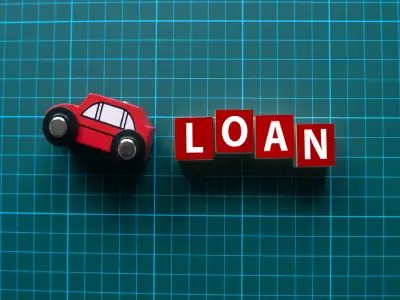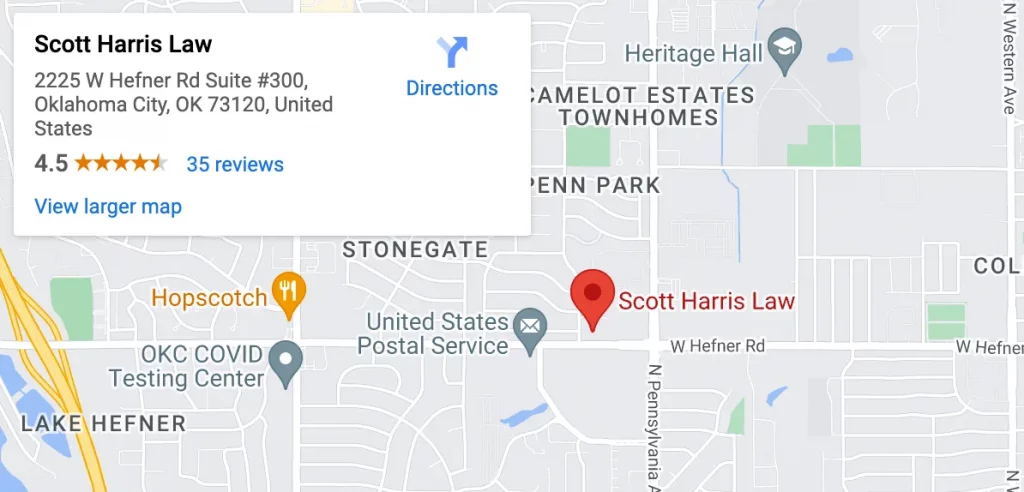Car Loans Attorney in Oklahoma City, Oklahoma
When someone learns that their car is about to be repossessed because they have fallen behind on payments, their debt issues are typically made worse. This burden affects one thing to another from their jobs to other properties. However, those who are in danger of having their car repossessed have options.
Our committed Oklahoma car loan attorney at Scott Harris Law, PLLC has helped clients with debt relief. Our lawyer has a wealth of knowledge in this area of law and has assisted clients in challenging cases involving car loans, debt negotiations and vehicle repossession. We give clients legal advice, counsel them on their alternatives, and support them all along the way.
Get in touch with us today for a free consultation!
Why do I need a Car Loans Attorney in Oklahoma?
 Legal disputes involving car loans can be troublesome, especially if you are unfamiliar with the procedures involved. This makes it wiser for you to hire a trusted Oklahoma City car loans attorney to represent you. If you don’t feel confident handling the negotiation process on your own, a debt negotiation lawyer can assist you there as well.
Legal disputes involving car loans can be troublesome, especially if you are unfamiliar with the procedures involved. This makes it wiser for you to hire a trusted Oklahoma City car loans attorney to represent you. If you don’t feel confident handling the negotiation process on your own, a debt negotiation lawyer can assist you there as well.
The law firm of Scott Harris Law, PLLC is renowned for its proficiency in assisting clients in debt settlement negotiations. Common ground can frequently be found through discussion in order to give you a resolution. You might be able to find relief through other options, get more time to pay off your bills, or get your vehicle loan debts or interest rates decreased.
It’s time to get in touch with our Oklahoma attorney if you require assistance with your car loans. We will meet with you to go over your issue and any potential choices. We can advise you on the appropriate course of action for defending your rights.
Cramdown for Car Loan Reduction
A car’s value starts to decline once you purchase it (depreciate). It’s not unusual to have a car loan balance that exceeds the value of your vehicle, particularly if you took out a high-interest loan, spent more than the vehicle was worth, carried over a previous loan balance into the current agreement, or bought a car that depreciates quickly.
In some cases, declaring bankruptcy can be beneficial. Through a Chapter 13 cramdown, you can lower your loan balance to the amount of your car.
What happens to the outstanding balance on a car loan?
The balance of your loan will be handled in your Chapter 13 plan in the same manner as your other nonpriority unsecured debts, such as credit cards and medical expenses. Since these creditors receive little to no payment under most Chapter 13 plans, your car lender is likely to earn nothing or pennies on the dollar on the remaining amount of your loan. You will have full ownership of the vehicle after your plan is completed. The loan’s remaining balance, if any, will be discharged (wiped out).
How to Negotiate when you can't pay your Car Loan?
Your greatest option is frequently to sell the car, pay off the lender, and utilize whatever money is left to either settle your other debts or buy a dependable used car if you anticipate having difficulties making your car payments for a couple of months.
Here are several possibilities to discuss with the lender, though, if you wish to keep your car.
Time is of the essence
Call the lender right away and ask to talk with someone in the customer care or collections department if you miss a payment. Do not wait. Cars are repossessed more quickly than any other sort of property.
Here are three options to discuss with your lender.
- Getting an extension
Lenders may grant you an extension if you can convince them that your condition is temporary. This will allow you to make the late payment at the end of the loan term. Unless you’ve already made at least six payments, the lender is unlikely to offer an extension. Additionally, most lenders don’t offer more than one extension per year and charge a fee for doing so.
- Change the date of your monthly payment
Asking the lender to move the date of your monthly payments to a time that is more convenient for when you get your income is an additional alternative. Your payment amount would be reduced if some lenders that agreed to this eliminate late penalties or lessen the interest charged.
- Rewrite the loan to reduce payments
To lower the monthly payments, the lender could propose to rewrite the loan. But this also means that you will have to pay more in total interest over a longer period of time. Make sure that lowering your monthly payment doesn’t force you to borrow more money.
Avoid loans with prepayment fees and those with interest that isn’t computed using the simple interest method.
What are the ways to get out of an Unaffordable Car Loan?
If the debt is no longer within your means, there are a few options for getting out. But if you want to reduce the impact to your wallet and credit rating, you’ll need to proceed with caution.
Renegotiate the loan
You can get in touch with your lender and work out a new payment plan. This is a particularly smart choice if you have good credit and a history of on-time payments and just require short-term help to catch up due to unexpected events.
You may be able to buy yourself some more time by postponing payments or even extending the period of your loan, but remember that the longer the term, the higher the total amount of interest will be. Examine your finances carefully and determine what kind of monthly payment you’ll be able to stick to for the remainder of your loan term before scheduling a meeting with your lender.
Sell the car
Selling the vehicle is another option. You must first obtain authorization from your lender because you do not have outright ownership of the vehicle. Inquire about the paperwork and transfer process, including the credit application a potential buyer would need to complete, by contacting the lender and informing a representative that you are interested in selling the vehicle.
Similar to selling, trading in your car via a dealership can be less complicated than doing it privately. A dealer might not offer you as much money for your car, though.
If the lender agrees and you want to do it, you could also be permitted to sell to a friend or a member of your family. However, you are still responsible for paying off any outstanding auto loan debt.
Voluntary repossession
As a last resort, you should think about giving your lender the keys to your car. Ask your lender if returning your car willingly will release you from the responsibility of your loan to make this procedure more comfortable.
By returning the vehicle, you spare your lender the expense and inconvenience of a repossession, which can allow you to negotiate a more agreeable ultimate pay-off figure. It might exclude you from some last-minute expenses like late or early payment penalties or fees associated with the selling of the car. However, using this approach could lower your credit score and make future auto financing more challenging.
Refinance your loan
You can reduce your monthly payment, your whole loan balance, or both by refinancing.
- Your monthly payment and total interest paid can go down with a lower interest rate. If you already have late payments on your account or have poor credit, it could be challenging for you to make payments.
- Your monthly payments may be lower with a longer payback period, but you will pay more in interest overall.
If your credit rating has increased since you initially approved your loan arrangement, refinancing can be a suitable choice. You’re more likely to be approved for lower interest rates and better conditions if your credit score is higher.
But keep an eye out for any additional costs that come with refinancing your loan. An example of one that is frequently used is an early repayment penalty, which is what it sounds like: a price for repaying the loan early.
Pay off the car loan
The possibility of paying off your loan in full may be a stretch if you are having trouble making your monthly payments. However, if you have the resources to pay it off, you can walk away and avoid the worry of more possible debt.
Paying down your loan in one hefty lump sum is one option. Verify the amount outstanding with your lender before proceeding with this option. It will probably include both your loan balance and your interest charges.
When to Consider Getting an Attorney
When repossessing your car and selling it again, the lender must adhere to specific legal restrictions. You might be able to defend against the deficiency case if the lender made a mistake in any way throughout the repossession procedure. You might be able to prevent or lessen the deficit judgment by hiring a trusted car loans lawyer to defend you in the lawsuit and look into what happened.
- Illegal repossession
When taking back the car, lenders and their agents cannot disturb the peace. For example, they are not allowed to physically touch you or take your car away from you.
- Lender did not sell the car
The lender must actually sell your car after claiming it in order to pursue you for a deficiency. There is no deficiency if the lender repossessed the vehicle but kept it.
- Lender did not issue proper notices
The lender is required to give you sufficient written notice of the sale when it intends to sell the vehicle. The notice is ineffective if it is incomplete or contains inaccurate information.
- The sale wasn’t carried out in a reasonable commercial manner
The purchase must be financially viable. The manner, time, location, and terms of the sale will typically determine whether a sale satisfies this requirement. Depending on whether the sale was private or public, the analysis changes a little. You can learn more about the criteria from an attorney.
- You willingly gave back the car in return for no deficiency
This agreement could stop your lender from subsequently obtaining a deficit judgment if your lender agreed to forgive the deficiency in exchange for your voluntary return of the vehicle. Be advised that the Internal Revenue Service will expect you to record the forgiven balance as income on your tax return if the lender forgives a balance of $600 or more. You’ll probably receive a Form 1099-C or 1099-A in this case.
- The expiration of the statute of limitations
The statute of limitations, which is the timeframe to file the lawsuit, may have expired if the lender waits a long time before suing you.
- State limitations on deficiencies
In certain circumstances, several jurisdictions place restrictions on the lender’s ability to recover a deficiency balance.
- Lender’s computation is incorrect
In other instances, the lender may total your obligations inaccurately or may include payments you’ve already made in the amount it asserts you owe. Additionally, you might not actually owe the interest rate, late fees, and other costs that the lender claims you do.
Call our Oklamohama City Car Loans Lawyer Now!
Consult with an experienced Oklahoma City car loan attorney at Scott Harris Law, PLLC as soon as possible if you face the possibility of falling into significant debt or losing your vehicle. We are committed to assisting families avert vehicle repossession or prevent them from selling them due to the enormous amount of car loan debt because we understand how much families rely on their personal vehicles.
Let our law firm examine your case to decide how we might assist you.
Contact us right away to arrange a free consultation!




